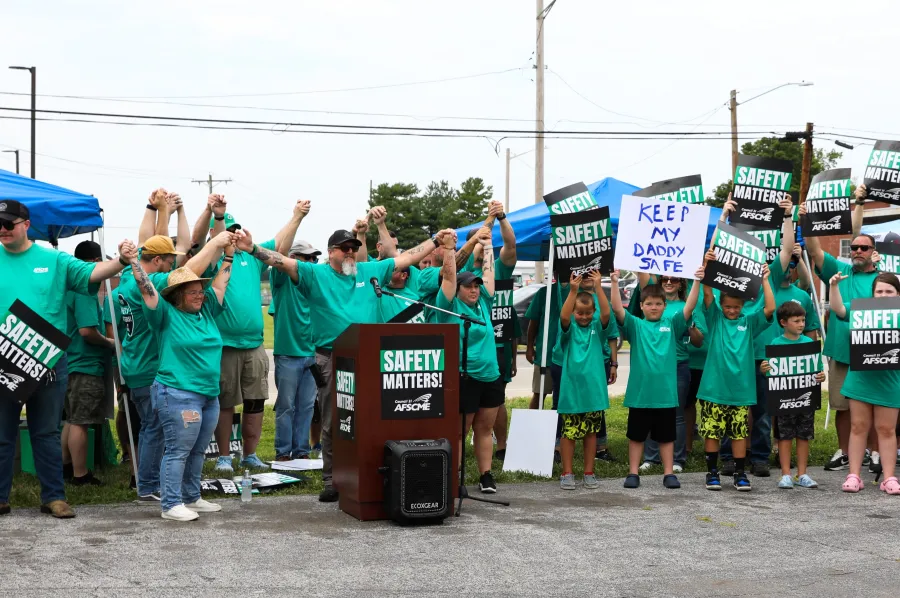Our Safety Matters: AFSCME members in IDOC and IDHS picket for safe workplaces

When confronted with management inaction in the wake of serious assaults on staff at their facilities, AFSCME members at Menard Correctional Center and Ludeman Developmental Center both took their fight for safe workplaces to the picket line.
Fighting for safety with solidarity at Menard CC
On July 8, AFSCME Local 1175 members at Menard Correctional Center took to the picket line with a simple message for the Illinois Department of Corrections: Our Safety Matters!
The picket was organized following a spate of assaults on correctional officers at Menard, a maximum-security facility that often receives individuals in custody who have committed assaults elsewhere in the system.
The numbers are shocking: From January to March, Menard staff experienced more than 30 assaults by incarcerated individuals. More recently, an offender headbutted an officer, breaking his nose, requiring hospitalization and surgery. The very next day, six officers required outside medical treatment following an assault by an offender swinging handcuffs as a weapon.
“As awful as these incidents were, we’re fortunate that they weren’t worse,” Local 1175 president and correctional sergeant Rick Hepp told The Southern Illinoisan. “But we can’t rely on good fortune. Before the worst can happen, we demand that management take responsibility for improving our working conditions.”
While Local 1175 organized the picket, the issues they face at Menard have become all too common at many other state prisons. Menard workers were joined in solidarity by AFSCME retirees and members of 10 other AFSCME locals—including those at Pickneyville, Robinson, Lawrence, Centralia, Graham, East Moline, Vandalia and Southwestern Correctional Centers—as well as members of the United Mine Workers of America.
The dangerous working environment for frontline workers at Menard is made worse by the severe understaffing at the facility. While Menard is the largest maximum-security facility in the state, housing 1,900 incarcerated individuals, it now has just 407 correctional officers in all—62% of the 657 officers allocated to the facility in the current budget—and just 748 total frontline employees versus 321 unfilled vacancies.
“Allocated headcount is considered the minimum requirement for a safe facility,” said AFSCME Council 31 Regional Director Eddie Caumiant. “We’re running at half of that.”
Council 31 is demanding that the Department of Corrections meet with the union to discuss concrete steps being taken to make the facility safer, as well as to provide information on how the department is filling the vacant positions at the facility.
“We will not back down until the department takes safety seriously, hires for the allocated positions, and makes the changes necessary to keep IDOC workers safe on the job,” Caumiant said.
Demanding safety in IDHS

Members of AFSCME Local 2645 at Ludeman Developmental Center took to the picket line in June to call attention to the growing number of assaults on staff under new changes management imposed on the facility.
Ludeman Developmental Center has historically only housed people with developmental disabilities. But recently, management has begun admitting dual-diagnosis individuals—that is, individuals with both a developmental or intellectual disability along with some form of mental illness.
Injuries to staff quickly followed. In recent months, a single individual with a dual diagnosis has caused serious injuries to staff. One Local 2645 member has had to have two separate surgeries to repair the damage caused to their hands. Another employee had part of their finger bitten off.
“We’ve always had injuries, but people are being injured in ways that used to be uncommon,” said Crosby Smith, a Mental Health Technician II and President of AFSCME Local 2645. “Everyone who has worked here, and especially newer folks, don’t have the training we need to protect ourselves and the other individuals.”
The union has argued to management that the new classifications of individuals being admitted to Ludeman should come with additional specialized training, bolstered security staff and better equipment.
Of critical concern is the lack of the radios mental health techs need to communicate with one another in the event of an emergency. There could be a situation where a staff member or an individual is in grave danger, but no one would be able to respond because there’s no way to call for help.
But as the number of injuries continues to climb, management still has not given Ludeman employees the training and resources they need to do their jobs safely. Local 2645 members took to the picket line to make sure management’s inaction in the face of serious staff assaults will not stand.
“The message was that our safety matters,” Smith said. “They need to do everything they can to show us that it does matter, and there needs to be some urgency shown on their part in addressing these issues.”



